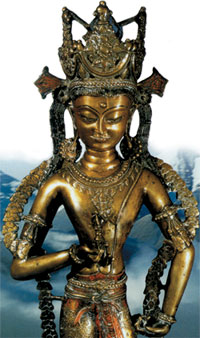The Religion before Allah is Islam... (Qur'an, 3:19)
Many people become excited at the idea of becoming "different" or more "original." In almost every society since the dawn of history, some individuals have tried to stand out and draw attention to themselves by their life style, clothing, hairstyles, or distinctive way of speaking. They've managed to stir up public reaction and attract interest at the same time.
In recent years, Western societies have seen the emergence of an unusual current that draws attention to itself by its rather strange life style. It's made up of individuals who want to attract attention by adopting Eastern culture, beliefs, and philosophies—of which the most important is Buddhism.

The eyes painted on four sides of this Buddhist temple in Katmandu in Nepal symbolize the idea that Buddha sees everything at every moment. At the foundation of Buddhist superstition lies the idea that Buddha is an idol with superhuman powers. (Left)
Shwedagon Pagoda, the famous Buddhist temple in Rangoon, Mayanmar. (Right)
Throughout the world, but especially in America and Europe, some individuals have been intrigued by Buddhism, spurred on mostly by the superstitious, secret, and awesome qualities they perceive in this religion. Generally, those who adopt Buddhism do so not because they believe in the logic of its philosophy, but because they're attracted by its "mystical" atmosphere, drawn to this superstition because it is presented to them as far more different and awesome than any other philosophy they encounter in their normal lives. For example, the story of how Buddhism came to be is related to them as a fantastic, mystic legend. Books and films about Buddhism depict Buddha as the source of a great mystery. Likewise, Buddhist priests are presented as possessors of secret, arcane knowledge. They fascinate Westerners with their exotic robes, shaved heads, style of worship, elaborate ceremonies, dwelling places, meditation, yoga and other such strange practices.

A Buddhist statue from Nepal, supposedly representing wisdom and skill.
For these reasons, Buddhism is seized upon as an important tool by people who want to demonstrate that they are different from others in their society, and who want to project the image of having discovered of a valuable secret. If an ordinary person suddenly shaves his head one day, puts on a brightly-colored robe and begins to teach Buddhist doctrine using mystical words he never uttered before, he will certainly attract curious attention and be thought of as "original."
A number of celebrities have adopted Buddhism for similar purposes. They make speeches in Tibetan Buddhist robes to appear different from others, drawing attention to themselves perhaps to become even better known to their public. They visit Buddhist temples accompanied by Buddhist priests and also make propaganda for the Buddhist religion.
You may have already learned a considerable amount about Buddhism and gained a general knowledge of it through both written and visual media. In this book, we'll examine Buddhism's superstitious character in the light of the Qur'an and let you see clearly this superstitious religion's more perverse aspects.
When we consider Buddhism's appearance, its scriptures, general beliefs, style of worship in the light of the Qur'an, we begin to see that its basic philosophy is founded on very deviant doctrines. Indeed, its worship contains strange practices leading its devotees to worship idols of stone and clay. As a belief, Buddhism is contrary to logic and intelligence. Countries where it has been adopted have mixed it with their own idolatrous ideas, traditions and local customs, joining it with myths and deviant ideas until it has evolved into a totally godless philosophy.
When fused with Brahmanism, Hinduism, Shintoism and other idolatrous Eastern religions, Buddhism has assumed a much darker form. Those who adopt this religion not because they believe it, but because they're attracted by the "secrets" of the Far East or just to draw attention to themselves, should realize that Buddhism contains perverse doctrines that can lead them to deny God, associate handmade idols with Him and lead a life of superstition. To ignore Buddhism's mindless aspects and espouse it just to be trendy and go along with others will result in great loss.
Those who make propaganda on behalf of Buddhism often present it as a means of salvation. Those who long to escape from a materialist society's hard, disputatious culture— along with its worries, anxieties, quarrels, pitiless rivalry, selfishness and falsehoods—resort to Buddhism as the way to achieve peace of mind, security, tolerance and a fulfilling life. But Buddhism is not, as it is generally thought to be, a belief that brings contentment. On the contrary, those who are taken into Buddhism are often drawn into a deep pessimism. Even people with a considerable level of education and modern worldview will become individuals who see nothing wrong with begging with their bowls in hand, who believe that in their next lives, human beings may be reborn as mice or cattle, and who expect help from idols carved from stone or cast in bronze. For these people, Buddhism's deviant beliefs inflict serious psychological damage. In countries where Buddhism is widespread, or in regions inhabited by many Buddhist priests, pessimism and gloominess are clearly prominent.
"...By His Words God wipes out the false and confirms the truth." (Qur'an 42: 24)
One basic reason for this is the laziness and indolence that Buddhism inculcates in its adherents. Because it lacks any faith in an eternal afterlife, Buddhism does not urge its devotees to be better or develop themselves, to beautify their environment, or to advance culturally. Islam always urges its adherents to seek out and apply themselves to what is better and more beautiful. Islam's dynamic moral teaching requires people to research and learn, to develop themselves and be useful to their communities. In one verse of the Qur'an (35: 28), God says that"Only those of His servants with knowledge stand truly in awe of Him."

"My servants, you who believe, My earth is wide, so worship Me alone!" (Qur'an 29: 56)
The only way to find true happiness and contentment in this world—to escape every kind of pessimism, unhappiness, and pitiless evil—is for people to submit themselves to God, our Creator, and lead lives that will win His approval. Our Lord, the only sovereign of Earth and Heaven has announced that for all people the way of salvation is to embrace the Qur'an, sent down as a guide to the true path. In the Qur'an (14: 1), God affirms,"… this is a Book We have sent down to you so that you can bring mankind from the darkness to the light, by the permission of their Lord, to the Path of the Almighty, the Praiseworthy." Those who believe in idolatrous religious like Buddhism should realize that they have been misguided:
That is God, your Lord, the Truth, and what is there after truth except misguidance? So how have you been distracted? (Qur'an, 10: 32)